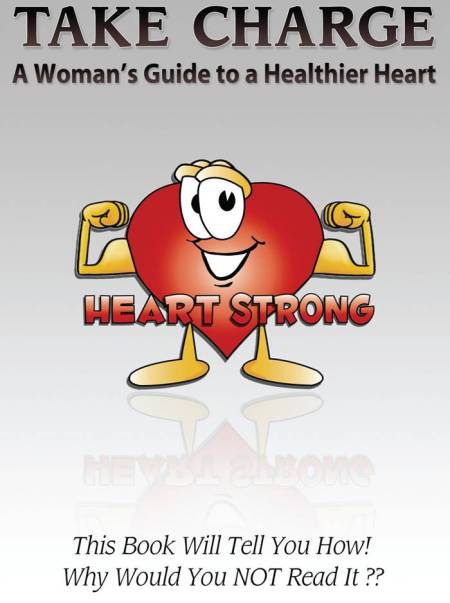02/15/2009
Women work, clean, cook, take care of children, spouses, parents, pets – but sometimes forget to take care of themselves. Their knowledge about health often comes from a two minute news report or short article. But every week there is some new research report telling us what we need to do. What we have done is compile a concise, easy reference book for women who are too busy to spend hours searching for this valuable information. We want to help you learn about your risks as early as possible and to develop a heart healthy lifestyle that will allow you to live a longer, healthier life. Make your health a priority! Carolyn Strimike and Margie Latrella are cardiac nurse practitioners specializing in the prevention of heart disease and stroke. They have over 40 years of nursing experience in Cardiology between them. The main goal of their work is to counsel, motivate and empower women to adopt healthy lifestyle choices!
We’ve taken all the current research and organized it into a handy, concise, easy to read and understand users manual for your heart. You’ll find everything you need to know about nutrition and exercise to cholesterol and blood pressure – and everything in between.
The book is loaded with charts and worksheets to help you get started on your way to a healthier lifestyle.
WE WROTE THIS BOOK FOR YOU…IT MAY HELP SAVE YOUR LIFE!
This guide will help you identify your risk factors for heart disease and stroke plus give you recommendations to help decrease your risk.
“Take Charge: A Woman’s Guide to a Healthier Heart” is available at http://heart-strong.com/Bookstore.html (on amazon.com and barnesandnoble.com)

 Leave a Comment » |
Leave a Comment » |  "heart attack", diabetes, Diet, exercise, fitness, food label, Go Red, Heart Disease, Heart Health, heartstrong, high blood pressure, Hormone replacement therapy, hypertension, Menopause, Nutrition, Stroke, Women and Heart Disease, Women and Stroke | Tagged: "heart attack", "heart healthy", diabetes, exercise, fitness, Go Red, Heart Disease, Heart Health, heart healthy habits, heartstrong, high blood pressure, Menopause, metabolic syndrome, Nutrition, Take Charge, Woman's Guide to a Healthier Heart, Women, Women and Heart Disease, women and high blood pressure |
"heart attack", diabetes, Diet, exercise, fitness, food label, Go Red, Heart Disease, Heart Health, heartstrong, high blood pressure, Hormone replacement therapy, hypertension, Menopause, Nutrition, Stroke, Women and Heart Disease, Women and Stroke | Tagged: "heart attack", "heart healthy", diabetes, exercise, fitness, Go Red, Heart Disease, Heart Health, heart healthy habits, heartstrong, high blood pressure, Menopause, metabolic syndrome, Nutrition, Take Charge, Woman's Guide to a Healthier Heart, Women, Women and Heart Disease, women and high blood pressure |  Permalink
Permalink
 Posted by heartstrong
Posted by heartstrong
02/15/2009
Heart disease is the # 1 killer in women while stroke remains the #3 killer of women. Similar to heart attacks women have worse outcomes (than men) when they have a stroke.
Some interesting (and disturbing) information about stroke outcomes in women:
- stroke risk factors are treated less aggressively in women (strokes are not prevented as well in women versus men)
- women have more disabilities after a stroke than men (more likely to require long term care after a stroke)
- women have larger (more severe) strokes
- women are less likely to receive appropriate treatments when they have a stroke (less likely to receive clot-busting medications that can decrease the amount of damage to the brain)
- women are older than men when they have a stroke
- women have different risk factors for stroke – atrial fibrillation (irregular heart rhythm) and high blood pressure are more common causes of stroke in women (smoking, coronary artery disease, diabetes and high cholesterol are more common in men)
- the incidence of stroke among younger women has been increasing
Many women are unaware of the stroke risk factors and warning signs of a stroke.
Signs and Symptoms of a Stroke:
- sudden numbness, weakness (usually on one side of the body)
- sudden severe headache
- sudden inability to understand what other people are saying
- sudden inability to speak
- sudden dizziness
A stroke is also referred to as a “Brain Attack” – need to get to the hospital quickly to prevent permanent damage, just like a heart attack.
Approximately 80% of strokes are preventable by making healthy lifestyle changes. It is important for women to learn what their individual risk factors for stroke include. Our new book “Take Charge: A Woman’s Guide to a Healthier Heart” discusses risk factors for heart disease and ways to prevent heart disease. Many of the risk factors for heart disease can also lead to a stroke (80% of strokes are called ischemic strokes meaning they are caused by a narrowing in the blood vessel leading to the brain and a blood clot – this is the same process that can cause a heart attack). For more information about our book please visit http://heart-strong.com/Bookstore.html (also available on Amazon.com and Barnesandnoble.com)
See the April 2009 issue of the journal STROKE for new research about stroke in women.
 Leave a Comment » |
Leave a Comment » |  "heart attack", Go Red, Heart Disease, Heart Health, heartstrong, Stroke, Women and Heart Disease, Women and Stroke | Tagged: "heart attack", "heart healthy", Go Red, Heart Disease, Heart Health, Stroke, Take Charge, Woman's Guide to a Healthier Heart, Women, Women and Heart Disease, Women and Stroke |
"heart attack", Go Red, Heart Disease, Heart Health, heartstrong, Stroke, Women and Heart Disease, Women and Stroke | Tagged: "heart attack", "heart healthy", Go Red, Heart Disease, Heart Health, Stroke, Take Charge, Woman's Guide to a Healthier Heart, Women, Women and Heart Disease, Women and Stroke |  Permalink
Permalink
 Posted by heartstrong
Posted by heartstrong




 Posted by heartstrong
Posted by heartstrong 




